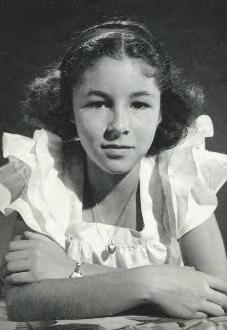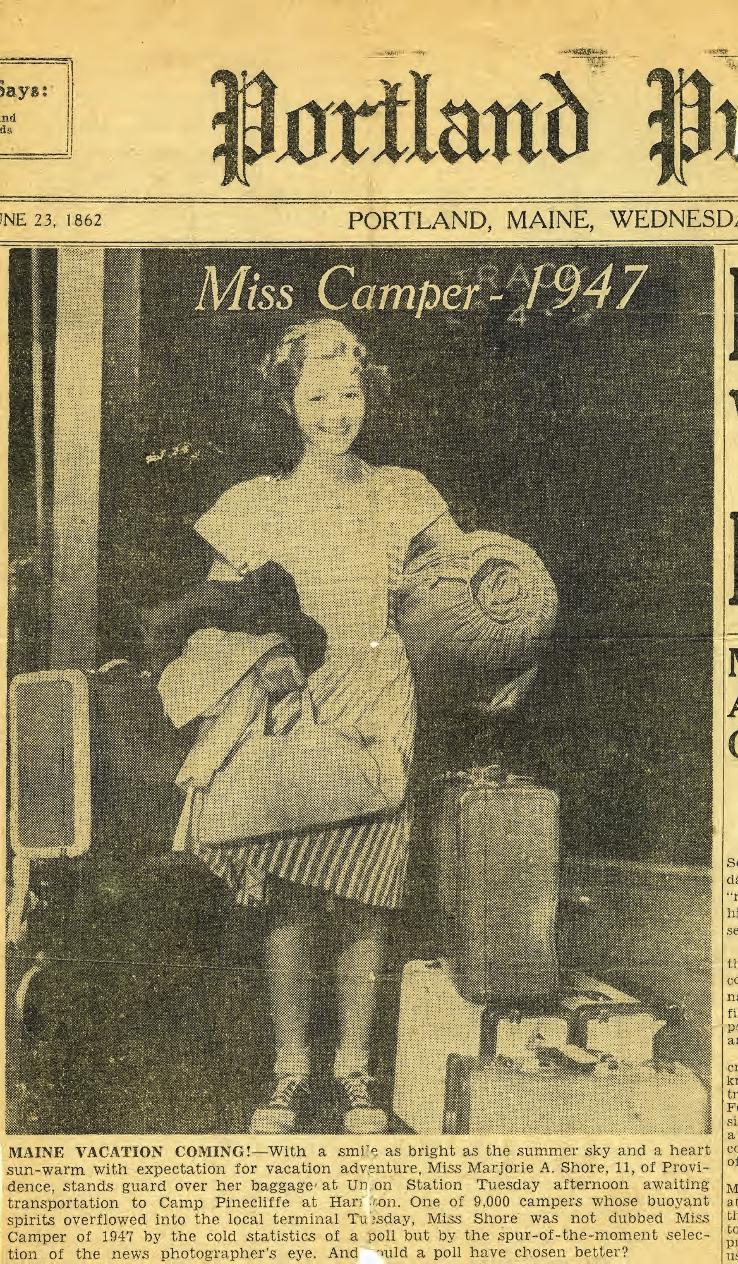
7 minute read
The War Years And Adolescence
by Udon Map
THE WAR YEARS AND ADOLESCENCE
Iwas four years old when World War II broke out and 10 years old when it ended. Despite my young age, this event is possibly the greatest driver of my memory. The dominance of the war permeated the fabric of our fears, our food, our possessions, our everything.
Advertisement
Here are some recollections of a little girl from Providence, Rhode Island. Each week, following the siren announcing air raid drills, we went to the basement, drew the shades to blacken the room, and waited for my Uncle Jack, the warden and neighbor, to declare we were safe and could end the drill. (He was beloved by my dad, and also responsible for my middle name, Alice.)
Back then, magazines were to us what television is today. “Look,” “The Saturday Evening Post,” and “Life” were our CNN. They displayed large, terrifying red and black photos of Adolph Hitler and the goose steppers. I read every word weekly for many years. When walking to Hope Street, twenty minutes from our house, (which I did often alone – no fear of kidnapping then), I was looking for Nazis behind every tree. Shopping in stores on Hope Street gave me some relief from boredom, but candy bars were scarce, and chewing gum was wrapped in plain paper because aluminum foil was used for weaponry.
At summer camp in Maine, candy lines each Friday night were treasured ‒ as were letters received from our relatives in the American forces overseas. Dubble Bubble gum was unavailable, and although I somehow had obtained a large supply and brought it to camp, it mysteriously disappeared from my bunk on the first day. A great treat was Friday nights when we received candy bars generally reserved for soldiers overseas. On visiting day, my Mom arrived without my promised bride doll as the nylon gown had been confiscated to make parachutes. Absence of nylon also disfigured my mother’s stockings, then made of a thick beige cotton. As victory over the enemy approached, a sense of euphoria permeated as kids jumped around and hugged each other.

At home, the war threaded through everyday lives. We had to eat everything on our “victory plates” as there were “starving children in Europe.” My parents smuggled from Germany a noted stamp collection as well as Jews (Heinz and his wife) who had dinner once with us but strangely never got in touch again. My father detested any type of manual work but reluctantly planted a “victory garden” and complained repeatedly about “that goddamn dog,” our German Shepherd, who ate every tulip and vegetable.
My Uncle Sidney and Cousin Ned were stationed in Europe and happily met up once in Italy. Ned, a bombardier, was shot down over enemy lines, rescued by Swiss resistance and ultimately survived. But the “missing in action” letter had arrived the night of my cousin Lucille’s wedding. Somehow my mother was the person who received it, yet hid it from Ned’s mother, Aunt Ida, until after the wedding. It was also the evening that my mother explained to Lucille (I was in earshot) what she could expect on her wedding night.
In those days, every family was threatened by the draft. My father would have been inducted were he not “4F”, i.e., too fat for combat. My brother was stationed in North Dakota and said it was so cold that his car handle froze off. My cousin Lucille was a WAC or a WAVE, doing her part in the war effort. I slept with a pillow over my head out of incessant fear of Hitler and his Panzer unit. Betsy and I continued to hunt down “spies,” but were comforted by my mother’s vociferous singing: “Over there, Over there, the Marines are coming!” My future husband’s medical school training was condensed down to three years in order to graduate more doctors to support the war effort.
In addition to the war, daily life bore as little resemblance to today as an elephant to an ant. Fewer foods, fewer means of entertainment, fewer choices, fewer everything was the rule. Milk was delivered in glass bottles in small horse drawn carts. I was terrified of the horses but loved the ice cream trucks and cars musically announcing knife sharpeners. Gas shortage necessitated rationing, but Sundays meant “joy rides,” frequently in the openair rumble seat of Uncle Sidney’s car. Opening up like luggage compartments, these seats were the poor man’s equivalent of modern-day convertibles.
Back then we had no air conditioning, men wore hats, women wore skirts and gloves to board planes. We had rotary dial phones, radios were in large wooden furniture pieces, and cookies were homemade. Apparently, women did not wear pants until World War II, and WACs and WAVES joined “BAMs” (broad assed marines). Sailors were omnipresent while on leave, sporting white, starched, ironed uniforms with looped “ties” and rectangular hats. For recreation, we played hopscotch, threw baseballs on the
street, played jacks and pick-up sticks, and never devoured pizza or ate at McDonalds simply because they weren’t in existence.
Without doubt, dancing school on Friday nights was the highlight of our social life. Following instruction on steps and rhythm, the boys (who wore white gloves) routinely raced to their chosen little ladies. I was always partnered with Paul, inches shorter than I, and a torture to his mother for sneaking out his bedroom window in order to leap across the roofs of neighboring houses. I later joined him in this exercise as did numerous friends whom to this day, I remember distinctly. I also recall my girlfriend’s mother who, in our later teens, recommended that we write on individual pieces of scrap paper the names of five boys we palled around with, throw the pieces of paper into a hat, and marry the one that we first drew from the hat – with the sure statement that “they’re all the same, you won’t even know the difference.”
How can I continue without mentioning my suspense before the nightly arrival of the funnies! The minute they were delivered, I jumped onto the living room floor, flat on my tummy with bent elbows and thrilled to the adventures of Dixie Duggan, Etta Kett, Li’l Abner and Superman. Yet, nothing topped the beloved radio series: Captain Midnight, The Shadow, Just Plain Bill, Helen Trent Soap Opera, Mr. District Attorney, and Digger Odell, Your Friendly Undertaker played by William Bendix. Movies were also absolutely imperative, replacing today’s TV, computers and iPhones. The preferred ones were Westerns – they were cheap to make in that sets and studios were not needed. We sat for at least three hours watching double headers every Saturday afternoon, and bussed to and from this marathon. It was heaven. ’Twas entertainment.
So what about our music? The big bands were OURS, and we were thrilled by Glenn Miller, Tommy and Jimmy Dorsey, Count Basie, Duke Ellington and Guy Lombardo (there was no New Year’s Eve without him!). We did the Charleston, Jitterbug, and Lindy Hop – also danced real slow and dreamy, cheek to cheek with our dates at the same “nightclub” every weekend night, followed by hamburgers at the diner. We dated in packs, necked in cars, smoked surreptitiously, and we girls wore wide skirts with cotton blouses and ribbons. We were decked out in bangs, loud lipstick,
bobby socks, saddle shoes, and knew nothing about tattoos, nose rings or colored hair. Our boys were not zoot suiters, but the black boys wore oversized jackets and wide lapels ‒ as well as pants big enough to hold a bushel of potatoes.
I must add that without our bikes and commercial buses, we went nowhere. For transportation to school, each morning I walked to the bus stop which was directly in front of the undertaker’s house, and Bobby Miranda, the undertaker’s son, and I were driven to school in a hearse. On those mornings when I was late, the hearse drove to my house and my parents howled as I was carted away like a corpse to my first class in European history.
In summary, our lives were predictable, lacking in confusing options, and were just plain simple. We weren’t bombarded by social media, conflicting social and political facts/opinions, and today’s complexities. We weren’t angels but were essentially stopped in our adolescent tracks by custom and expectation.
My next installment of this memoir addresses my unforgettable trip to Los Angeles to visit my 13-year-old girlfriend – and her parents’ unquestionable regret over my presence.
Dad, Me & Barrie











